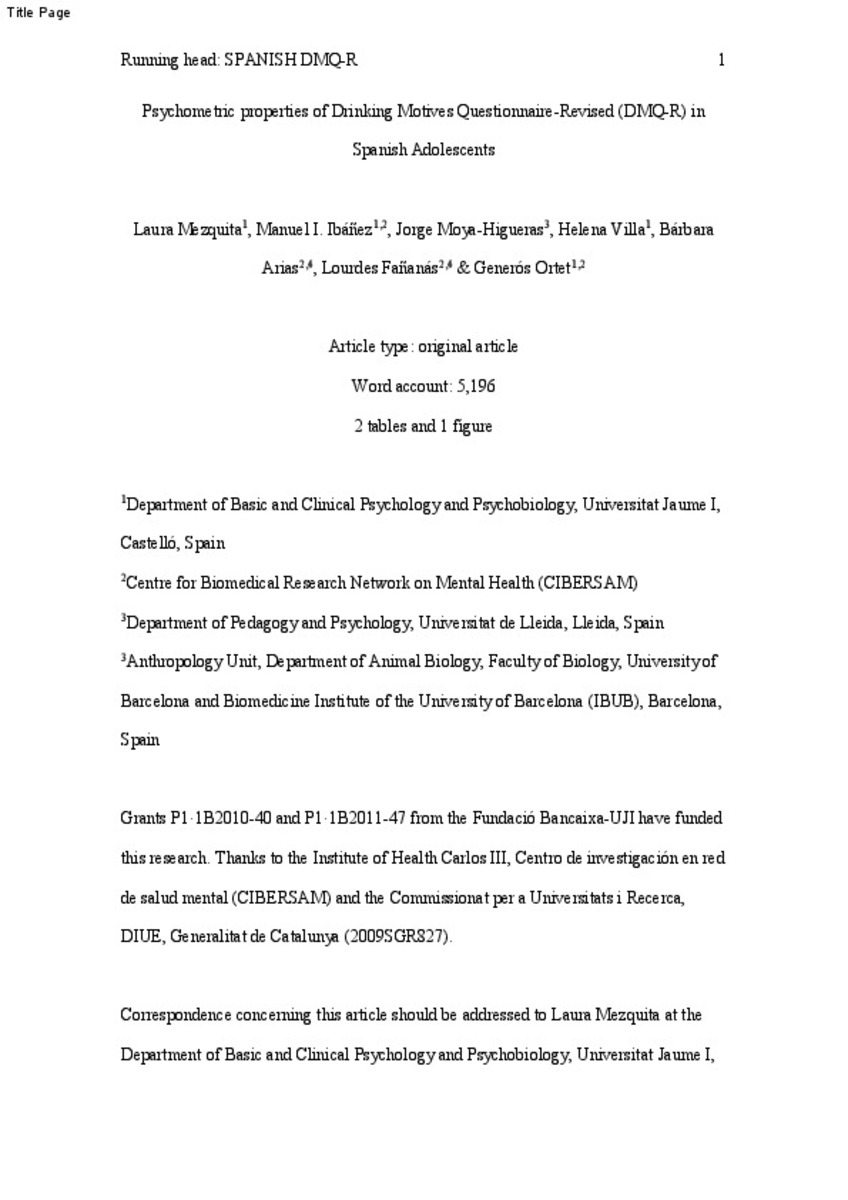Mostrar el registro sencillo del ítem
Psychometric properties of drinking motives questionnaire-revised (DMQ-R) in Spanish adolescents
| dc.contributor.author | Mezquita, Laura | |
| dc.contributor.author | Moya-Higueras, Jorge | |
| dc.contributor.author | Villa Martín, Elena | |
| dc.contributor.author | Ibáñez, Manuel I | |
| dc.contributor.author | Arias, Barbara | |
| dc.contributor.author | Fañanás Saura, Lourdes | |
| dc.contributor.author | Ortet, Generós | |
| dc.date.accessioned | 2016-07-13T08:51:00Z | |
| dc.date.available | 2016-07-13T08:51:00Z | |
| dc.date.issued | 2016 | |
| dc.identifier.issn | 1015-5759 | |
| dc.identifier.issn | 2151-2426 | |
| dc.identifier.uri | http://hdl.handle.net/10234/161662 | |
| dc.description.abstract | The Drinking Motives Questionnaire-Revised (DMQ-R; Cooper, 1994) is the most widely used questionnaire to assess drinking motives. This research aimed to adapt and study the validity and reliability of the Spanish DMQ-R and its short form in a sample of adolescents. We assessed 504 drinkers at Time 1 (T1, Mage = 14.15, SD = 0.60, 52.38% female), of whom 238 participated in a 1-year follow-up (T2, Mage = 15.05, SD = 0.54, 58.82% female). They completed the DMQ-R at T1, the alcohol use measure at T1 and T2, and the alcohol-related problems questionnaire at T2. We performed Confirmatory Factor Analyses (CFAs) to test the structure validity of the questionnaire, Cronbach’s alphas to test the internal consistencies of the scales, and path analyses to test the concurrent and predictive validity of motives on alcohol outcomes. CFA indicated that the short form of the 4-factor model best fitted the data. Cronbach’s alphas were .70 or higher. Direct effects of the path analysis showed that social motives cross-sectionally predicted alcohol use, while coping motives prospectively predicted alcohol-related problems. Indirect effects showed that social motives prospectively predicted alcohol use and problems. To conclude, the DMQ-R short form appears to be reliable and valid to assess drinking motives among Spanish adolescents. | ca_CA |
| dc.description.sponsorShip | Grants P1 1B2010-40 and P1 1B2011-47 from the Fundació Bancaixa-UJI have funded this research. Thanks to the Institute of Health Carlos III, Centro de Investigación Biomédica en Red de Salud Mental (CIBERSAM), and the Commissionat per a Universitats i Recerca, DIUE, Generalitat de Catalunya (2009SGR827). | ca_CA |
| dc.format.extent | 25 p. | ca_CA |
| dc.format.mimetype | application/pdf | ca_CA |
| dc.language.iso | eng | ca_CA |
| dc.publisher | Hogrefe | ca_CA |
| dc.relation.isPartOf | European Journal of Psychological Assessment (2016) | ca_CA |
| dc.rights | © 2016 Hogrefe Publishing This article does not exactly replicate the final version published in the journal "European Journal of Psychological Assessment". It is not a copy of the original published article and is not suitable for citation. | ca_CA |
| dc.rights.uri | http://rightsstatements.org/vocab/InC/1.0/ | * |
| dc.subject | assessment | ca_CA |
| dc.subject | drinking motives | ca_CA |
| dc.subject | prospective | ca_CA |
| dc.subject | adolescents | ca_CA |
| dc.subject | DMQ-R | ca_CA |
| dc.title | Psychometric properties of drinking motives questionnaire-revised (DMQ-R) in Spanish adolescents | ca_CA |
| dc.type | info:eu-repo/semantics/article | ca_CA |
| dc.identifier.doi | http://dx.doi.org/ 10.1027/1015-5759/a000319 | |
| dc.rights.accessRights | info:eu-repo/semantics/openAccess | ca_CA |
| dc.relation.publisherVersion | http://econtent.hogrefe.com/doi/full/10.1027/1015-5759/a000319 | ca_CA |
| dc.type.version | info:eu-repo/semantics/submittedVersion | ca_CA |
Ficheros en el ítem
Este ítem aparece en la(s) siguiente(s) colección(ones)
-
PSB_Articles [1292]
Articles de publicacions periòdiques







